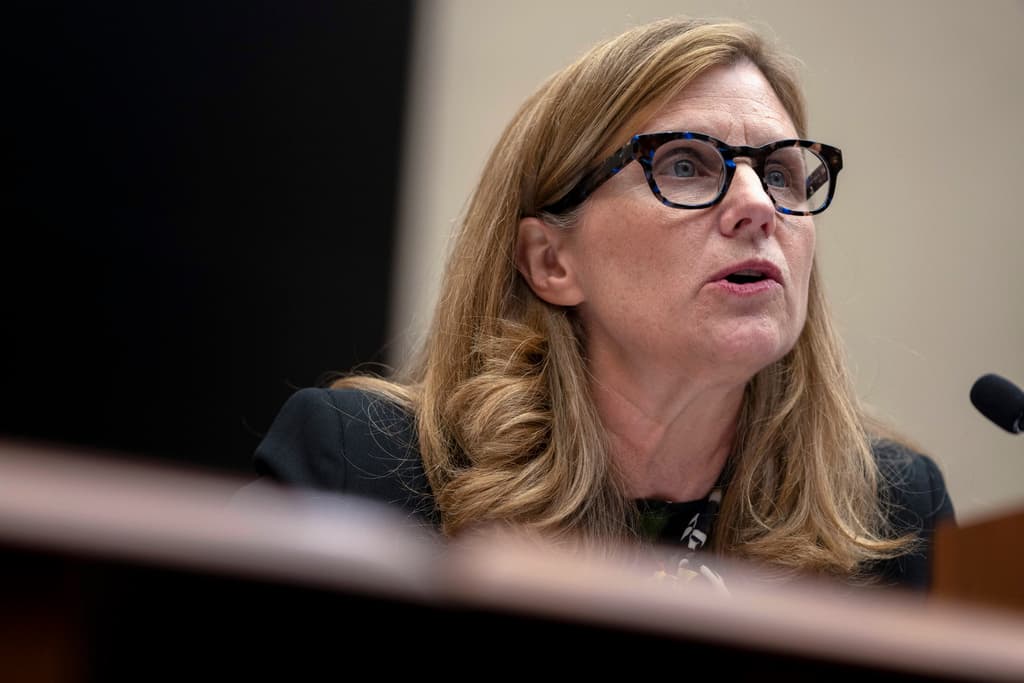Resignation of Penn’s Leadership Could Prove To Be First Tremors in an ‘Earthquake in Higher Education’
Both President Magill and Chairman Bok are out at Penn after the former refused to answer in a straightforward manner questions from Congress on how the school regarded threats of violence to Jews.

The resignations Saturday evening of both the chairman and president of the University of Pennsylvania are being met with a surge of cautious optimism by alumni, students, and parents who have been watching with growing alarm the rise of antisemitism not only at Penn but elsewhere in the Ivy League.
The resignation of Penn’s president, Elizabeth Magill, was announced Saturday afternoon in a letter from the university’s chairman, Scott Bok. Then, in an astonishing development that followed only hours later, he announced that he was resigning as well.
The resignations are the first to follow a hearing in Congress on campus antisemitism. At the hearing Ms. Magill and her counterparts at Harvard and MIT — Presidents Gay and Kornbluth respectively — shocked the House and millions of Americans by failing to give straightforward answers to a question from Congresswoman Elise Stefanik of New York.
Ms. Stefanik asked each of the three presidents whether calling for the genocide of Jews violated their school’s code of conduct or rules regarding bullying and harrassment. Ms. Stefanik demanded a “yes or no” answer. Instead, each of the “prevaricating presidents” — as Maureen Dowd called them this evening in a column in the Times — refused to answer.
“A context-dependent decision” is the Ivy League lingo with which Ms. Magill evaded the question and sealed her doom as Penn’s president. It prompted Ms. Stefanik to suggest that the three presidents would be unable to stay in power and to predict — in an interview with our M.J. Koch — that their answers would precipitate “an earthquake in higher education.”
One could call the two resignations today at Penn that earthquake’s first tremors, which are spreading on the internet. Mr. Bok sent an email out to the Penn community Saturday evening announcing Ms. Magill’s resignation. He reported that she would stay on until an interim president is appointed and would remain a tenured faculty member at the law school.
The announcement included a brief and formal statement from Ms. Magill, which made no mention of the controversy. Yet a short time later, Mr. Bok released another statement, this time announcing his own resignation, which he said would be, “effective immediately.” He wrote that Ms. Magill had “made a very unfortunate misstep” at the hearing, “after five hours of aggressive questioning before a Congressional committee.”
Both resignations pleased the faction of Penn alumni, students, and parents who have been airing concerns about the growing isolation of Jews on the Penn campus. The announcements have surely given hope to members of the Harvard and M.I.T. communities who have been calling for the resignations of Presidents Gay and Kornbluth in the wake of their equally poor performances before Congress.
Wealthy donors to Penn and its business school, Wharton, had already been pressing for both of the resignations that took place today. One alumna, Janet Brief, wrote on an online group chat that she was relieved to learn that, in addition to Ms. Magill, Mr. Bok had resigned. “He was clearly part of the problem,” Ms. Brief wrote. “The University has not gotten the message, this has taken too long.”
Many alumni are focused on what happens next. Dr. Logan Levkoff, who graduated from both Penn undergraduate and graduate schools said, “While I am happy that Magill and Bok have resigned, it should never have come to this point. The fact is antisemitism…is a cancer that has metastasized throughout our institution, faculty and student body. This is only the beginning. It’s not over yet.”
“This is just the tip of the iceberg,” is the way it was put by Lisa Ohebshalom, a Penn alumna. “The school’s policies, teachers, and curriculum all have to be reviewed and real changes have to be made.”
Eyal Yakoby is a senior at Penn and was one of three Jewish students to speak immediately prior to the congressional hearing about the antisemitism they experienced on their respective campuses. He sees the resignations as, “necessary steps toward the rebuilding of the school’s reputation” and is hopeful Penn will hire a replacement for Magill who will ensure Jewish students feel safe on campus, something he regrets he has not felt of late.
Alumni WhatsApp groups are filled with speculation about potential candidates, such as Michael A. Fitts, current president of Tulane University, and Ambassador Jon Huntsman, one of the first Penn donors to pull his gift to the school in October. Mr. Huntsman was America’s ambassador to Communist China, Russia, and Singapore.
Another possibility who might be in the running is Ezekiel Emanuel, current vice provost for global initiatives at Penn and senior fellow at the Center for American Progress. All of these names have been mentioned in chat groups of alumni of Penn or parents of Penn students.
________
This dispatch has been expanded from the bulldog.

